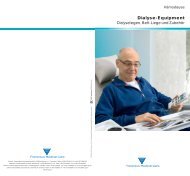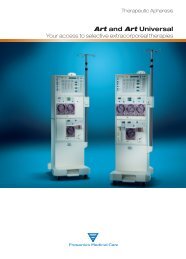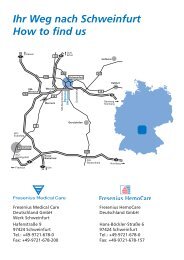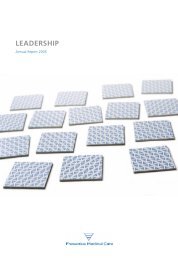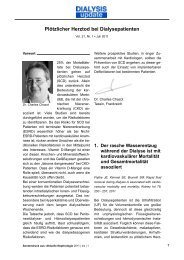Operations and Business Environment - Fresenius Medical Care
Operations and Business Environment - Fresenius Medical Care
Operations and Business Environment - Fresenius Medical Care
You also want an ePaper? Increase the reach of your titles
YUMPU automatically turns print PDFs into web optimized ePapers that Google loves.
departments enter into outline contracts with suppliers<br />
<strong>and</strong> coordinate queries from internal departments <strong>and</strong><br />
external partners.<br />
In 2006, we concluded delivery agreements for electricity<br />
<strong>and</strong> gas at a favorable point in time <strong>and</strong> were therefore<br />
able to keep the purchasing prices stable. Despite<br />
higher purchasing quantities <strong>and</strong> the pooling of needs,<br />
due to the development of oil prices no savings could<br />
be made on petroleum-based products <strong>and</strong> semifinished<br />
goods such as plastics <strong>and</strong> different types of<br />
foils for product packaging.<br />
In the U.S., we reduced the average inventory level by<br />
6 % over the previous year, to 86 days, by optimizing<br />
our distribution logistics. Overall, we have been able to<br />
significantly improve the efficiency of our warehousing<br />
in the last five years. Although piece numbers increased<br />
by about 40 % during this period, we reduced the stock<br />
on h<strong>and</strong> by a quarter. In addition, the integration of<br />
Renal <strong>Care</strong> Group was a primary focus of our activities.<br />
We ensured a smooth transition phase for supplying<br />
more than 400 RCG clinics.<br />
A steady supply is particularly important for our peritoneal<br />
dialysis (PD) patients. They can carry out the<br />
vital treatment only if we provide them with the<br />
necessary PD solutions <strong>and</strong> disposables in time <strong>and</strong> in<br />
sufficient quantity. In the U.S., we rely on 13 regional<br />
distribution centers. They are located in areas where<br />
a high percentage of patients live. We can reach more<br />
than half of them within two hours <strong>and</strong> three-fourths<br />
within four hours. The products needed for treatment<br />
are supplied to 95 % of our PD patients within<br />
six hours.<br />
Production<br />
<strong>Fresenius</strong> <strong>Medical</strong> <strong>Care</strong> has a global network of production<br />
sites on all continents. The selection of production<br />
sites is primarily determined by the respective<br />
product. For the production of highly complex dialysis<br />
machines, for example, we rely on decades of experience<br />
at a central facility. Our analyses show that<br />
the concentrated production know-how regarding this<br />
product group offsets the costs of transporting the machines<br />
to our international markets.<br />
Other products are manufactured directly in the regions<br />
where the dem<strong>and</strong> is particularly strong. As the global<br />
leader in dialysis, we possess the necessary expertise to<br />
develop efficient production processes that are customized<br />
for each specific product type.<br />
Our products are primarily in dem<strong>and</strong> within the euro<br />
<strong>and</strong> U.S. dollar regions. We have established a predominantly<br />
decentralized structure for our production sites<br />
to meet the dem<strong>and</strong> <strong>and</strong> significantly reduce transport<br />
costs. An additional advantage: our plants in the U.S.,<br />
Japan <strong>and</strong> Europe help protect us from currency fluctuations<br />
<strong>and</strong> minimize transaction risks, as the costs <strong>and</strong><br />
the revenue generated are in the same currency.<br />
We have implemented a particularly consistent global<br />
production network for dialyzers: our sites in Ogden<br />
(Utah, U.S.), St. Wendel (Germany) <strong>and</strong> Inukai (Japan)<br />
allow us to not only operate as a provider but also as<br />
a producer of dialysis products in these three major<br />
dialysis markets. In addition, we operate a plant for<br />
dialyzers in France <strong>and</strong> other countries.<br />
Hemodialysis machines are produced mainly at two<br />
sites – in Schweinfurt (Germany) <strong>and</strong> in Walnut Creek<br />
(California, U.S.). While the German plant manufactures<br />
components as well as complete dialysis machines,<br />
the American plant is specialized in the production of<br />
dialysis machines. Concentrates for hemodialysis are<br />
produced at various sites around the world – including<br />
Italy, Great Britain, Spain, Turkey, Morocco, Argentina,<br />
Brazil, Colombia, Australia <strong>and</strong> the U.S.<br />
We operate two of our largest plants for peritoneal<br />
dialysis supplies in Mexico <strong>and</strong> Japan. Our extensive<br />
product portfolio also includes peritoneal dialysis<br />
machines, bloodlines <strong>and</strong> water preparation equipment,<br />
which are manufactured in our factories in North<br />
America, Europe, Latin America, Asia <strong>and</strong> Australia.<br />
We produced about 65 million dialyzers <strong>and</strong> fiber<br />
bundles in 2006, some five million more than in the<br />
previous year. Considering the total volume of approximately<br />
160 million dialyzers produced globally in 2006,<br />
<strong>Fresenius</strong> <strong>Medical</strong> <strong>Care</strong> supplied about 40 % of them.<br />
Due to the ever-growing dem<strong>and</strong> for dialyzers from<br />
<strong>Fresenius</strong> <strong>Medical</strong> <strong>Care</strong>, our production sites in all<br />
regions have reached their capacity limits. As a conse-<br />
83<br />
<strong>Fresenius</strong> <strong>Medical</strong> <strong>Care</strong> 2006



